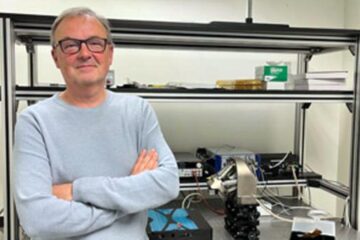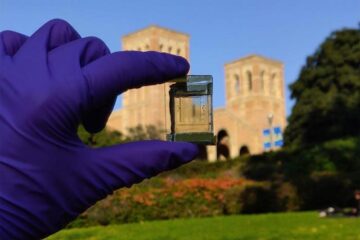Boron-Oxygen Triple Bonds stabilized for the first time ever

Why is this renowned scientific magazine so enthusiastic about the work of the Würzburg chemists? This is because stable triple bonds have already been realized for almost all chemical elements in the world that theoretically allow a connection of this nature to be established between them – with the exception of boron and oxygen.
Admittedly, triple bonds between boron and oxygen had already been created in the laboratory, but until now this had only been achieved under extreme conditions: the temperatures had to be well below freezing point for this to happen and both elements have to be present as gases – and in the end the triple bond had no enduring stability.
Triple bond stable at room temperature
It is a very different story for Würzburg's chemistry professor Holger Braunschweig and his colleagues Achim Schneider and Dr. Krzysztof Radacki. They have produced, purified, and characterized a stable boron-oxygen triple bond at room temperature in commonly used solvents.
In its purest form, their product exists as a colorless powder. It can withstand temperatures of up to 100 degrees Celsius for many hours. It is not affected by either daylight or UV radiation. Holger Braunschweig concludes: “For the first time ever, science has at its disposal a stable molecule in which a triple bond has been realized between oxygen and boron.”
Exciting prospect for basic research
What use will this have? There are no foreseeable applications for the molecule in everyday life as yet. But this newly created boron-oxygen triple bond is an exciting prospect for basic research.
Reactivity studies have already been conducted on the new molecule at Würzburg's Institute of Inorganic Chemistry. The researchers have joined other elements directly to the triple bond and also separated them from it further. How can the molecule be modified? What can be added to it? These questions will also set the agenda for the work that the scientists wish to pursue next.
Holger Braunschweig: recognized boron expert
Holger Braunschweig is a recognized expert in the chemistry of the element boron. His work in this area has recently been acknowledged by the German Research Foundation (DFG): in 2009, he was awarded the Leibniz Prize, which comes with 2.5 million euros in funding and has the reputation of being a kind of “German Nobel Prize”.
Boron – a unique element
What is so special about boron? For chemists, this element represents a challenge: it is electron deficient and in a sense craves these particles. It can only satisfy this craving by forming compounds with other elements. “The compounds that boron creates are highly unusual,” explains the professor. A leading textbook on inorganic chemistry even devotes a full chapter to this unique element – this alone is indicative of its special status.
Oxoboryl Complexes: Boron-Oxygen Triple Bonds Stabilized in the Coordination Sphere of Platinum, Holger Braunschweig, Krzysztof Radacki, and Achim Schneider, Science 16 April 2010 328: 345-347, DOI: 10.1126/science.1186028
Contact
Prof. Dr. Holger Braunschweig, Institute of Inorganic Chemistry, University of Würzburg, phone +49 (0)931 31-85260, h.braunschweig@uni-wuerzburg.de
Media Contact
More Information:
http://www.uni-wuerzburg.deAll latest news from the category: Life Sciences and Chemistry
Articles and reports from the Life Sciences and chemistry area deal with applied and basic research into modern biology, chemistry and human medicine.
Valuable information can be found on a range of life sciences fields including bacteriology, biochemistry, bionics, bioinformatics, biophysics, biotechnology, genetics, geobotany, human biology, marine biology, microbiology, molecular biology, cellular biology, zoology, bioinorganic chemistry, microchemistry and environmental chemistry.
Newest articles

Internet can achieve quantum speed with light saved as sound
Researchers at the University of Copenhagen’s Niels Bohr Institute have developed a new way to create quantum memory: A small drum can store data sent with light in its sonic…

A chip unique in the world
A team from UPV and iPRONICS has manufactured the first universal, programmable and multifunctional photonic chip on the market. A team from the Photonics Research Laboratory (PRL)-iTEAM of the Universitat…

Advance in light-based computing
…shows capabilities for future smart cameras. UCLA-developed experimental device demonstrates ability to reduce glare in images. Researchers developing the next generation of computing technology aim to bring some light to…





















